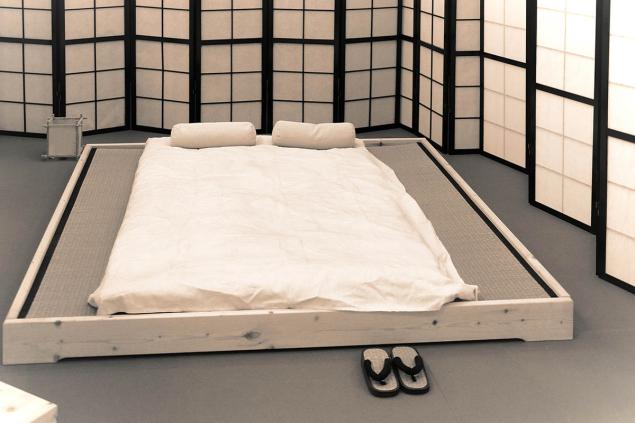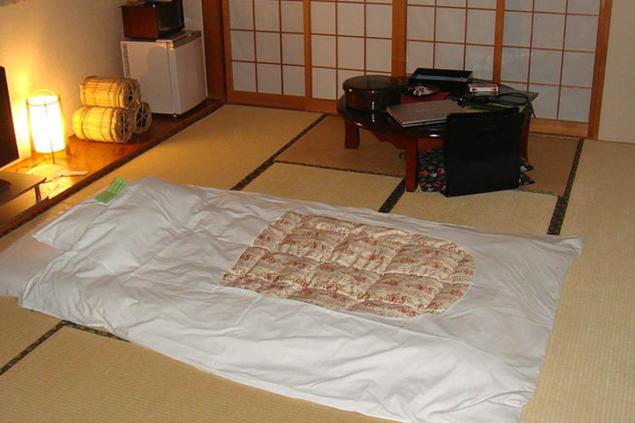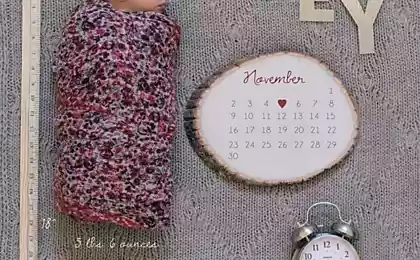188
What happens if you sleep on the floor like a wise Japanese?
When I started living in a rented apartment and had a bed, my life changed for the better. I finally began to get enough sleep, and in general, lying in a cozy lair is always pleasant. When I heard about the Japanese sleeping on the floor, I was surprised. Is that comfortable? Anyway, Japanese tradition They are very different from ours.

Sleeping on the floor is not just a tradition. This is a conscious choice that every Japanese person makes for their health. As it turns out, this habit has many advantages. I explain everything in detail further in the article.
In Japan, longevity has long been a common phenomenon. In the Land of the Rising Sun lives more than 30 thousand people over 100 years. Some would say it's genetics. In fact, it all depends on your lifestyle.
I once told you about the Japanese centenarian Kane Tanaka. This incredible woman lived a long 119 years and passed away last year. One of the rules of her everyday routine was sleeping on the floor.

Although this seems strange to us, because we are used to comfort, the Japanese see many advantages in such a dream. First, it is good for the back. If your back has been hurting for a very long time, you should try to sleep on a flat surface. I'm pretty sure you'll feel the difference after your first night on the floor.
Secondly, due to sleep on a flat surface, your spine will be held in the correct position. This will prevent the body from twisting, and during the day you will begin to slouch less. Sleeping on the floor helps correct poor posture.

When you sleep on the floor, your body weight is evenly distributed and you don’t feel pressure on different parts of it. As a result, the work of all internal systems improves and in the morning you wake up more alert. In addition, sleeping in this position prevents possible numbness and tingling in the body.
The Japanese prove not by word, but by deed, that sleeping on the floor brings continuous benefits. In addition to health things, you will improve the quality of sleep. And after waking up, you will not want to lie down for another 5 minutes, watching your last dream. An alarm clock will no longer be torture for you.

Wikimedia also makes sleeping on the floor easier. You don’t have to buy a bed or a mattress. And these are pretty expensive things. This way you can save a decent amount of money. According to Japanese tradition, sleep is based on futon. This is a thick cotton mattress, which folds comfortably after sleep and does not take up space in the apartment.
If you have a serious back problem, be sure to talk to your doctor before you start sleeping on the floor. There are a number of contraindications, because of which sleep on a hard surface can only harm.

For example, sleeping on the floor can not be allergic. Here it is simple: on the floor gathers dust and other dirt. Because of this, people prone to allergies may have a cough and burning sensation in the throat. Keep that in mind! Also, such a dream is not suitable for people suffering from ailments associated with bones. Joints may start to hurt more after a night spent on the floor.
Older people are undesirable to conduct such experiments, if their health leaves much to be desired. With age, mobility decreases, so it can be difficult for grandparents to get off the floor.

It is also quite cool on the floor. That's what stops me the most from changing places to sleep. If you sleep on the floor, you will have to arrange a place so that you do not wake up in the middle of the night from the cold.
Oh, that Japanese tradition! Agree, there is something beckoning and unknown in them. I really wanted to sleep on the floor to see how comfortable it was. What's your idea?
Photo by David McKelvey, CC0 1.0 Universal Public Domain Dedication, via Wikimedia Commons

Sleeping on the floor is not just a tradition. This is a conscious choice that every Japanese person makes for their health. As it turns out, this habit has many advantages. I explain everything in detail further in the article.
In Japan, longevity has long been a common phenomenon. In the Land of the Rising Sun lives more than 30 thousand people over 100 years. Some would say it's genetics. In fact, it all depends on your lifestyle.
I once told you about the Japanese centenarian Kane Tanaka. This incredible woman lived a long 119 years and passed away last year. One of the rules of her everyday routine was sleeping on the floor.

Although this seems strange to us, because we are used to comfort, the Japanese see many advantages in such a dream. First, it is good for the back. If your back has been hurting for a very long time, you should try to sleep on a flat surface. I'm pretty sure you'll feel the difference after your first night on the floor.
Secondly, due to sleep on a flat surface, your spine will be held in the correct position. This will prevent the body from twisting, and during the day you will begin to slouch less. Sleeping on the floor helps correct poor posture.

When you sleep on the floor, your body weight is evenly distributed and you don’t feel pressure on different parts of it. As a result, the work of all internal systems improves and in the morning you wake up more alert. In addition, sleeping in this position prevents possible numbness and tingling in the body.
The Japanese prove not by word, but by deed, that sleeping on the floor brings continuous benefits. In addition to health things, you will improve the quality of sleep. And after waking up, you will not want to lie down for another 5 minutes, watching your last dream. An alarm clock will no longer be torture for you.

Wikimedia also makes sleeping on the floor easier. You don’t have to buy a bed or a mattress. And these are pretty expensive things. This way you can save a decent amount of money. According to Japanese tradition, sleep is based on futon. This is a thick cotton mattress, which folds comfortably after sleep and does not take up space in the apartment.
If you have a serious back problem, be sure to talk to your doctor before you start sleeping on the floor. There are a number of contraindications, because of which sleep on a hard surface can only harm.

For example, sleeping on the floor can not be allergic. Here it is simple: on the floor gathers dust and other dirt. Because of this, people prone to allergies may have a cough and burning sensation in the throat. Keep that in mind! Also, such a dream is not suitable for people suffering from ailments associated with bones. Joints may start to hurt more after a night spent on the floor.
Older people are undesirable to conduct such experiments, if their health leaves much to be desired. With age, mobility decreases, so it can be difficult for grandparents to get off the floor.

It is also quite cool on the floor. That's what stops me the most from changing places to sleep. If you sleep on the floor, you will have to arrange a place so that you do not wake up in the middle of the night from the cold.
Oh, that Japanese tradition! Agree, there is something beckoning and unknown in them. I really wanted to sleep on the floor to see how comfortable it was. What's your idea?
Photo by David McKelvey, CC0 1.0 Universal Public Domain Dedication, via Wikimedia Commons
A new recipe for pilaf, which is prepared without rice and red meat, replace the usual ingredients
Criteria for choosing kitchen worktops























